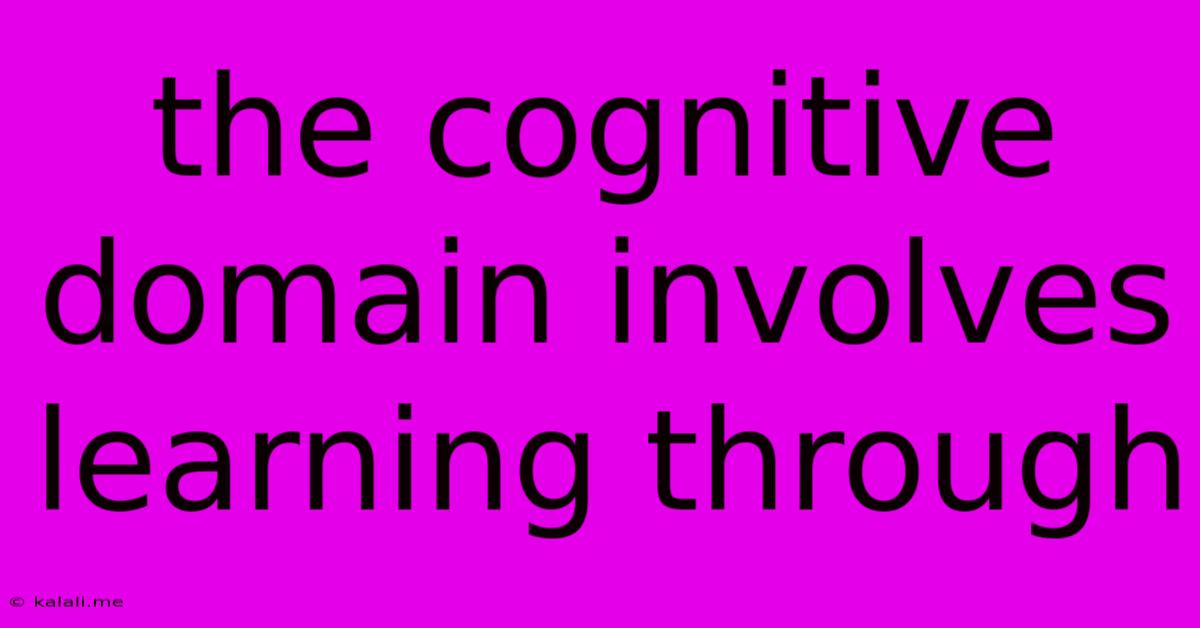The Cognitive Domain Involves Learning Through
Kalali
Jun 14, 2025 · 3 min read

Table of Contents
The Cognitive Domain: Learning Through Thinking, Reasoning, and Problem-Solving
The cognitive domain encompasses the mental skills and processes involved in acquiring knowledge, comprehending information, applying knowledge, analyzing situations, evaluating ideas, and creating new concepts. It's essentially how we learn through thinking, reasoning, and problem-solving. Understanding the cognitive domain is crucial for educators, trainers, and anyone interested in optimizing the learning process. This article explores the intricacies of cognitive learning, its key components, and practical applications.
What exactly is cognitive learning? It's a complex process encompassing various levels, from simple recall to higher-order thinking skills. It goes beyond rote memorization and focuses on understanding, interpreting, applying, and creating knowledge. This type of learning involves intellectual skills like critical thinking, analysis, and problem-solving, allowing learners to actively process and make sense of new information.
Key Components of Cognitive Learning: Bloom's Taxonomy
Bloom's Taxonomy provides a widely recognized framework for understanding the different levels of cognitive learning. It's a hierarchical model, progressing from simpler to more complex cognitive processes. While different versions exist, the core levels typically include:
- Remembering: This involves recalling facts, terms, concepts, and basic information. Think simple recall quizzes or multiple-choice questions testing basic knowledge.
- Understanding: Demonstrating comprehension of information, translating it into one's own words, interpreting meaning, and summarizing key concepts.
- Applying: Using learned information in new situations, solving problems, and applying concepts to practical scenarios. This level tests the ability to use knowledge in a different context.
- Analyzing: Breaking down information into its component parts, identifying relationships, distinguishing between facts and inferences, and making connections.
- Evaluating: Judging the value of information, making critical assessments, supporting opinions with evidence, and discerning strengths and weaknesses.
- Creating: Generating new ideas, synthesizing information from multiple sources, designing solutions, and creating original work. This is the highest level, requiring creativity and innovation.
How to Enhance Cognitive Learning: Practical Strategies
Optimizing cognitive learning involves employing strategies that cater to different learning styles and cognitive levels. Some effective methods include:
- Active Recall: Testing yourself regularly on the material, instead of passively rereading it. Techniques like flashcards and practice quizzes are highly effective.
- Spaced Repetition: Reviewing material at increasing intervals to strengthen long-term retention. This method combats the forgetting curve and improves memory consolidation.
- Elaboration: Connecting new information to pre-existing knowledge, creating meaningful associations, and forming mental links. This makes the information more memorable and easier to retrieve.
- Interleaving: Mixing different subjects or topics during study sessions, forcing your brain to switch between concepts and enhancing retrieval practice.
- Dual Coding: Combining verbal and visual learning techniques. Using diagrams, images, and mind maps alongside text helps strengthen memory and comprehension.
- Problem-Based Learning: Engaging in activities that require learners to solve complex problems, applying their knowledge creatively. This encourages higher-order thinking skills and deeper understanding.
Cognitive Learning in Different Contexts
The principles of cognitive learning apply across various contexts:
- Education: Teachers can design curriculum and assessments to target different cognitive levels, fostering critical thinking and problem-solving skills in students.
- Training: Professionals in various fields can benefit from training programs that emphasize application and analysis, ensuring effective skill development.
- Personal Development: Individuals can use cognitive learning strategies to improve their study habits, problem-solving abilities, and critical thinking skills.
By understanding the cognitive domain and employing effective learning strategies, individuals can significantly enhance their learning experience, leading to deeper understanding, improved retention, and greater intellectual capacity. Mastering these techniques is key to not only academic success but also lifelong learning and personal growth.
Latest Posts
Latest Posts
-
Find Equation Of Plane Through Point And Parallel To Plane
Jun 14, 2025
-
1 Mole Of O2 In Grams
Jun 14, 2025
-
What Are All Factors Of 8
Jun 14, 2025
-
Choose The Correct Html Element For The Largest Heading
Jun 14, 2025
-
Light Wave Is Longitudinal Or Transverse
Jun 14, 2025
Related Post
Thank you for visiting our website which covers about The Cognitive Domain Involves Learning Through . We hope the information provided has been useful to you. Feel free to contact us if you have any questions or need further assistance. See you next time and don't miss to bookmark.